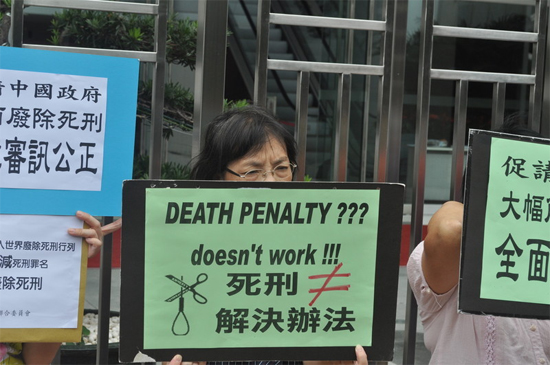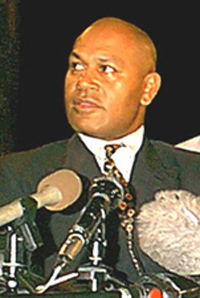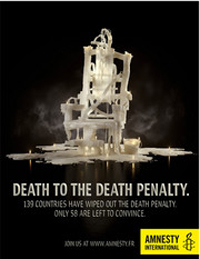
Pacific Media Centre news desk
The Pacific is the only region with a clean slate and no executions or death sentences over the past decade, says Amnesty International in a new report today about the global state of death penalties.
Only two Pacific nations or territories have been singled out for mention in the report – Fiji where 2000 attempted coup leader George Speight was sentenced to death for treason and then his punishment was commuted to life imprisonment within hours. Fiji still has the death penalty on its lawbooks for treason and mutiny in the military code although it has been abolished for other crimes.
Fiji still has the death penalty on its lawbooks for treason and mutiny in the military code although it has been abolished for other crimes.
The other territory cited was American Samoa where prosecutors were reported to have unsuccessfully sought the death penalty last August against a man charged with the murder of a police officer. The last execution in the territory was carried out in 1939.
Amnesty International says the Pacific is also well on its way to becoming the first region to be free of the death penalty, it revealed in the 52-page report Death Sentences and Executions in 2010.
Only four Pacific nations still have the death penalty in their laws: Papua New Guinea, Nauru and Tonga besides Fiji.
The deputy director of Amnesty International Aotearoa New Zealand, Rebecca Emery, says it will now be working hard to ensure these countries remove the death penalty from their laws.
Law books campaign
“While you have a sentence like that on your law books, it’s capable of being enacted. So that would be our concern,” she told Radio New Zealand International.
“Even though from the region, I mean there’s been no threat of that – it is there. And to completely remove this threat you do have to change laws.”
The total number of executions officially recorded by Amnesty International in 2010 dropped from at least 714 people in 2009 to at least 527 in 2010.
China is believed to have executed thousands in 2010 but continues to maintain its secrecy over use of the death penalty.
“When Amnesty was founded in 1961, only nine countries had abolished the death penalty for all crimes, and capital punishment was hardly considered a human rights issue.
 Fifty years on, the trend towards worldwide abolition is unmistakeable, with only a handful of countries carrying out the majority of executions,” said Emery.
Fifty years on, the trend towards worldwide abolition is unmistakeable, with only a handful of countries carrying out the majority of executions,” said Emery.
“The last decade was one which saw real progress towards the global abolition of the death penalty, and we commend our Pacific neighbours – generally considered small players in the international community – for being world leaders in this area,” adds Emery.
“An important step forward was made in February when Fiji, responding to the UN Human Rights Council, committed to abolishing the death penalty for crimes under military law.”
Encouraging moves
The year 2010 also saw encouraging moves by both the Solomon Islands and Kiribati which both changed their votes positively in the UN General Assembly’s global moratorium on the death penalty in December – which was supported by more UN member states than ever before.
“Drawing upon our country’s strong anti-death penalty stance, we will now be working hard to ensure that Papua New Guinea, Nauru, Tonga and Fiji completely remove the death penalty from their books, sending a signal to the rest of the world that an end to the death penalty is not only possible, it is inevitable,” said Emery.
An Asia-Pacific summary
• In 2010 Amnesty International was not able to confirm comprehensive figures on the use of the death penalty for China, Malaysia, North Korea, Singapore and Vietnam although executions were known to have been carried out in all these countries. Available information from five other countries in the region confirmed at least 82 executions were carried out in Asia.
• Eleven countries imposed death sentences but continued not to carry out executions in 2010: Afghanistan, Brunei Darussalam, India, Indonesia, Laos, Maldives, Myanmar, Pakistan, South Korea, Sri Lanka and Thailand.
• The Pacific Islands remained free from death sentences and executions.
• In January 2010 the President of Mongolia announced a moratorium on executions with a view to abolition of the death penalty.
Amnesty International opposes the death penalty in all cases without exception regardless of the nature of the crime, the characteristics of the offender, or the method used by the state to kill the prisoner.
The organisation believes the death penalty violates the right to life and is the ultimate cruel, inhuman and degrading punishment, and has been campaigning for the global abolition of the death penalty since 1977.
New Zealand removed the death penalty for all offences from its statute in December 1989. New Zealand also played a leading role in a global initiative to end the death penalty in 2007 when the government co-authored a United Nations resolution calling for a global moratorium on the use of the death penalty.
Death Sentences and Executions in 2010 report



